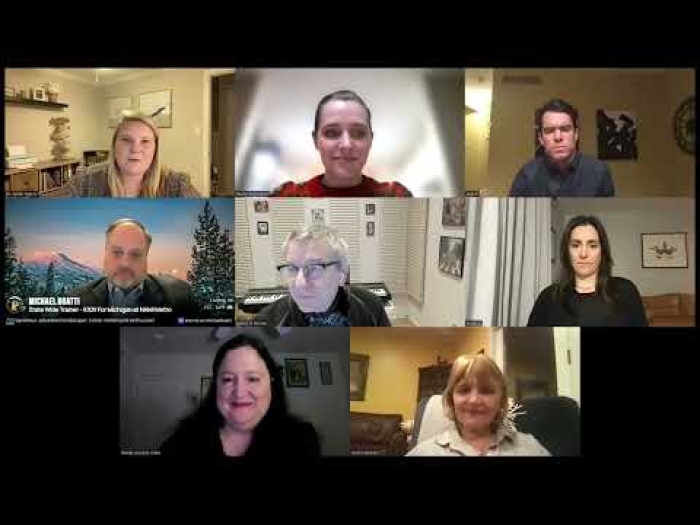Cheryl King, Ph.D., a leading expert in child and adolescent suicide prevention, emphasizes the need for a community approach and an open line of communication for families.
7:00 AM
Author |

Suicide is the second-leading cause of death for adolescents. The social and academic stresses of these years, combined with the availability of alcohol and drugs and the effect of social media, leave many parents concerned about the mental well-being of their children.
MORE FROM MICHIGAN: Sign up for our weekly newsletter
Cheryl King, Ph.D., professor of psychiatry at Michigan Medicine and one of the nation's leading experts on adolescent and child suicide prevention, gave us some helpful strategies on how to broach this difficult topic with children and teens.
How do you identify someone who may be suicidal?
King: We listen and watch for several key signs or red flags for possible suicide risk. These include signs of severe or overwhelming emotional pain or distress. Teens may talk about suicide or express suicidal thoughts and hopelessness. In addition, we may see worrisome changes in behavior. As examples, teens may withdraw from people or activities they typically take pleasure in and enjoy, or they may start to use alcohol or drugs. Other behavior changes could be more interpersonal conflict and signs of agitation or sleep disturbance. The behavioral signs vary across teens.
How can parents safely and effectively talk to their children about suicide?
King: The main thing to remember is that before the conversation begins, parents need to manage their own emotions. Parents should talk with their teen at a time when they feel they can maintain a calm listening stance.
Here are a few other ways parents can work to handle this discussion:
-
Keep the channels of communication open and be direct. Do not be afraid to ask your child questions. Do not be afraid to directly ask if they are thinking of harming themselves or thinking of suicide. These questions are asked in the context of caring and wanting to help them resolve their pain.
-
Normalize their experiences. Reassure them there are no taboo thoughts, and attenuate any possible shame. You can ask your child, "Given all you are dealing with right now and given what is happening at school, have you had any thoughts about hurting yourself or thoughts of killing yourself?" Be direct. Parents could also say, "I wonder if you have thoughts of suicide."
-
Listen to your child's distress and stay calm. No matter what your child says, parents need to react calmly. Listen when your child is upset. Make a point to hear their distress. If parents do not do this, children may shut down or react with anger.
-
Take a collaborative approach and do not dictate the solution. King suggests saying, "I'm sorry you are in this pain. Let's think of what we can do. Let's see what we can do to figure this out. I want to be helpful. Let's get help, and let's learn more together."
What should you do if your child tells you he or she is suicidal?
King: First, it's important to let your child know how much you appreciate their honesty and courage in sharing something so difficult with you. Remain calm, sit with your child and listen to the reasons they are feeling this way. Let them know you understand. Then, consider the best next steps. This may include consulting with your pediatrician or making an appointment with a mental health professional. Children who express significant thoughts of suicide or who are planning a suicide attempt need an immediate evaluation. This may involve your local county's crisis services or local emergency department if necessary.
SEE ALSO: Suicide Warning Signs and Risk Factors Everyone Should Know
In addition, the National Suicide Prevention Lifeline is 1-800-273-TALK (8255). Staffed by well-trained counselors, the Lifeline is available 24 hours a day, seven days a week. Unfortunately, access to mental health services across the country is strapped, but children with elevated suicide risk are always a priority.
What else can we do to support at-risk youth?
King: It's critical that we emphasize a community effort to address this problem. Adults who interact with at-risk youth can be prepared to provide support. This could be teachers, school counselors, coaches, friends, family and others. I'd encourage all schools across the nation to incorporate depression, suicide risk or broader mental health screenings in their health programs. The more people who are informed, the better chance we have at helping at-risk youth. We are also working to do this in emergency departments.
Also, the barriers for help-seeking still need to be lowered. We are getting better, but mental health stigma still persists, and we need to work on it constantly. We need to get to a place where going to see a therapist or psychiatrist is seen as just like going to the doctor to get a broken ankle checked out.
Also, parents need to remember they are never alone. There are so many resources available for help.
King is the lead author of Teen Suicide Risk: A Practitioner Guide to Screening, Assessment, and Management.
Michigan Medicine hosted a Facebook Live chat on this topic on Feb. 7, 2018. View the chat, featuring clinical assistant professors in the Department of Psychiatry Polly Gipson, Ph.D., and Cynthia Ewell Foster, Ph.D., below.

Explore a variety of health care news & stories by visiting the Health Lab home page for more articles.

Department of Communication at Michigan Medicine
Want top health & research news weekly? Sign up for Health Lab’s newsletters today!





